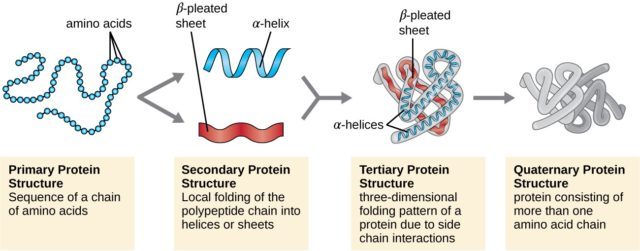It should be noted that proteins are fundamental for our health, giving value to their important plastic function since they constitute 80% of the dehydrated protoplasm in the whole cell. Also, thanks to their functions such as bioregulation, they allow enzymes to form. In addition, every part of them has a more specific function for the welfare of people.
Due to its main physicochemical properties, they can be classified into 3 types; simple holoproteid proteins, since these are formed only by amino acids or their different derivatives; compounds also are known as heteroproteids, since they are composed especially by amino acids together with a series of various substances. There is also a 3rd type known as derived proteins; substances also composed by the unfolding and denaturing of the other 2 types. All 3 are essential for good development and functioning of the body and are always active in different functions for it.
Some of the main functions of proteins are enzymatic, structural, contractility for actin and myosin, forming sucrose and pepsin, immunological activity, as well as the production of collagen, scabs, fibrin, protective and defensive cell components, helps the transduction of signals and homeostasis, helping to maintain the PH and, of course, doing its main function as a chemical buffer.

How are Proteins made?
They are constituted by a series of amino acids and are generally determined by their genetics except for some antimicrobial peptides with a non-ribosomal analysis, this indicates that genetic information gives to a large extent what kind of proteins does a cell, tissue or any other part of the body contains.
How they are synthesized depends on how the series of genes that encode are regulated, which indicates that there are signal protectors in addition to a good part of external factors, that team up so proteins can be expressed at a certain moment.
Why are they so important?
They are of great and remarkable importance among the molecules that constitute living beings since all the procedures in biology depend on the appearance of these molecules. Some examples gave the importance of its functions in the organism, such as actin and myosin, which are responsible for the contractions of muscles; the well-known “antibodies” whose function is to defend the body against intruders (i.e. viruses and bacterias), and thus combat infections.
Also, it is important to highlight the function of bodily reserves such as ovalbumin in the egg. It appears as one of the guarantors of good functioning of the body; the collagen that integrates the body fibers of high resistance; the enzymes that catalyze the different chemical reaction. Another one is the hemoglobin and associated molecules that have the transport function of the blood. Cell receptors; these are specifically fixed in molecules to determine all organic responses. Other important elements are the regulators; these help to the existence of a balance in the activities of people as is the case of insulin responsible for regulating glucose.
Additional functions of proteins are giving resistance and elasticity to tissues. For example, the production of immunoglobulin transports substances through the organism. On its part, hemoglobin carries oxygen through the cells. The protein receptors found in the cell membrane and their role is to receive different signals for the cell to perform its function.
General protein sources
Their main sources include foods such as eggs, legumes, yogurt, meat, cheese, nuts, and cereals. In the case of fish and poultry, they make a great nutritional contribution in a balanced diet because they contain more than 20 important amino acids for overall health.

